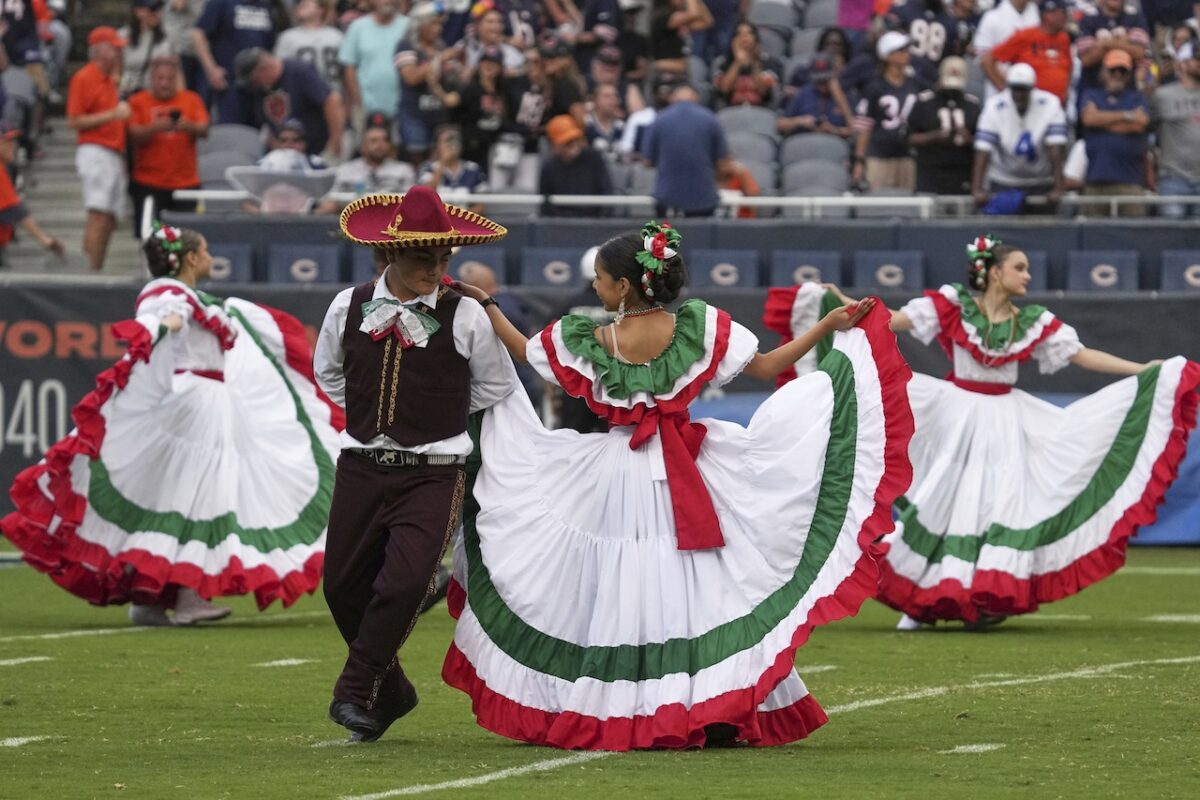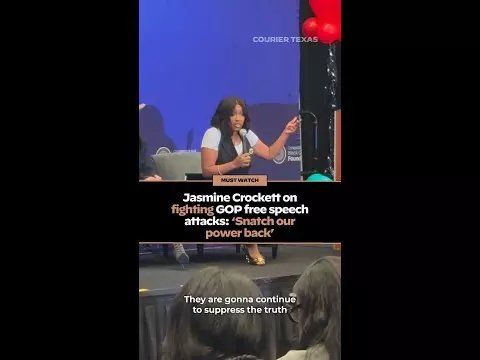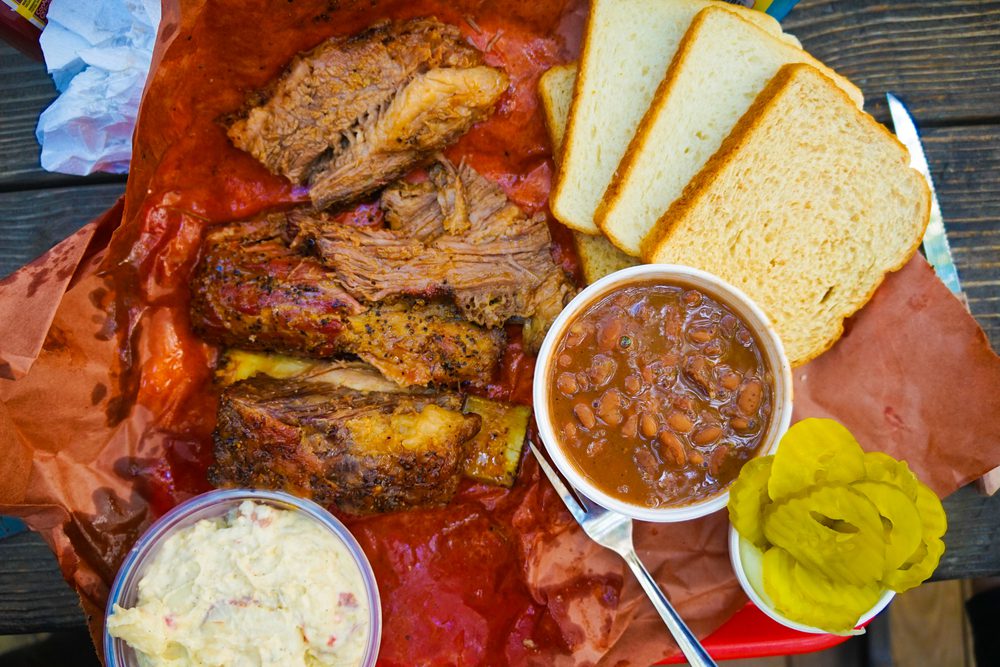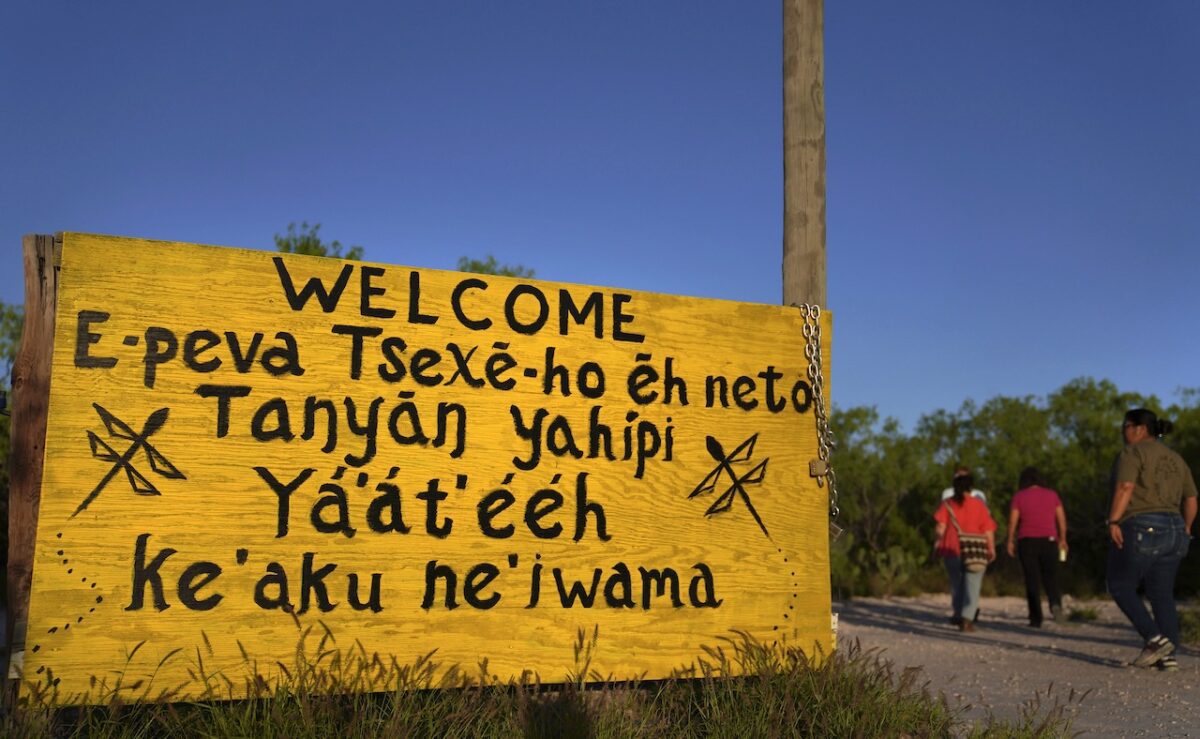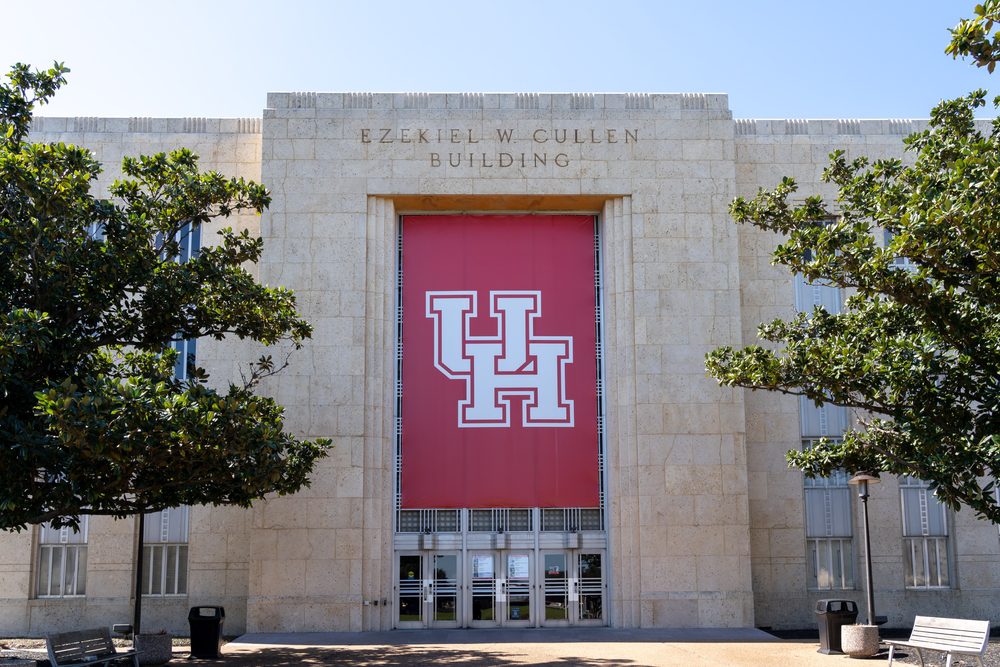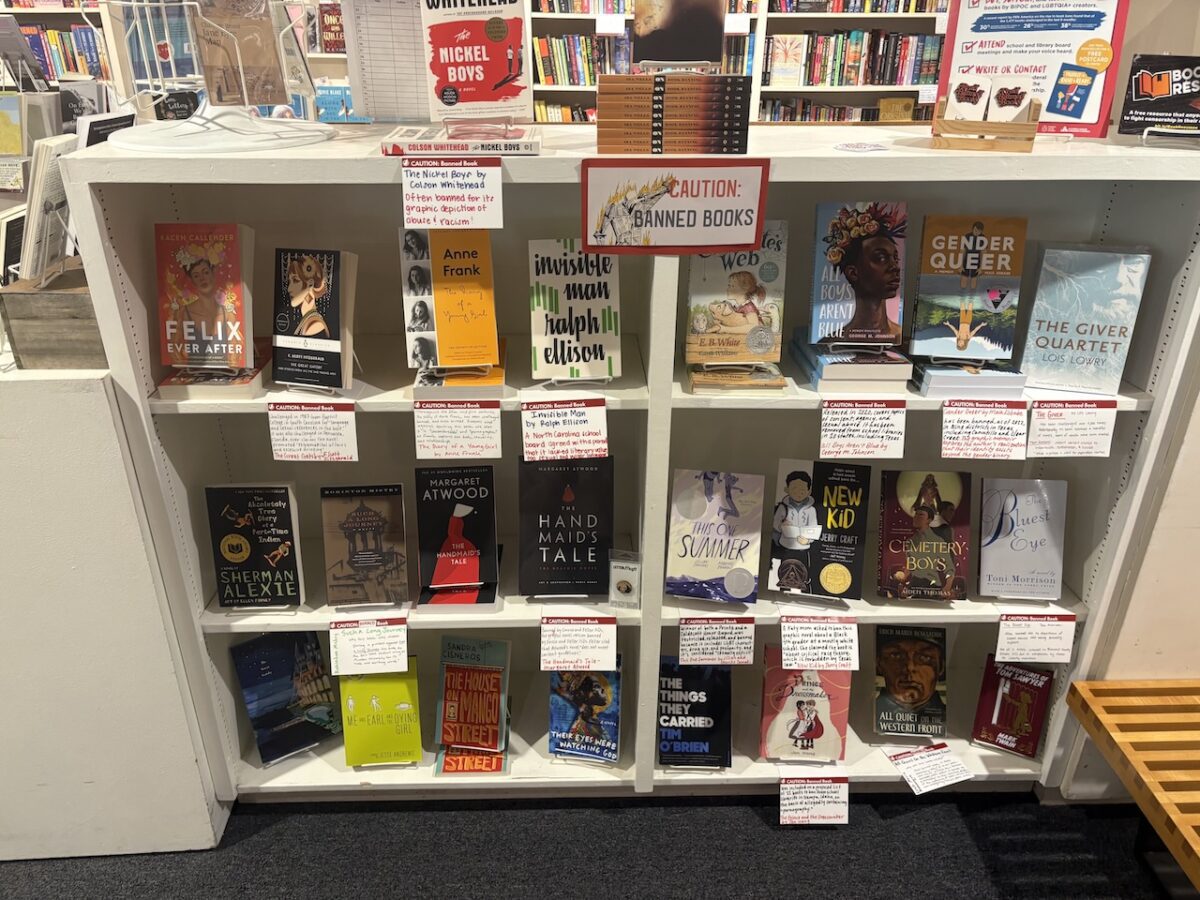
The banned book section at Brazos Bookstore. (Sierra Rozen/COURIER HTX)
Banned books have been hugely controversial when it comes to Texas education. Literature is fundamental to learning—and when the government is trying to dictate what students can and can’t read, important, diverse voices can be lost.
Over the summer, COURIER Texas talked to local booksellers and librarians about why banning books can be so detrimental, and which novels are close to their heart.
“Speak” by Laurie Halse Anderson

“Speak” was first published in 1999. (Sierra Rozen/COURIER HTX)
Banned by Conroe ISD and North East ISD, “Speak” has often been banned for its inclusion of sexual assault and profanity involving high schoolers. The novel follows Melinda, a freshman who becomes selectively mute after a traumatizing event over the summer that has left her isolated from her peers.
Funny enough, this was actually one of the first books I was required to read when I was a freshman in high school. It is now often banned from schools and would very rarely appear on a summer reading list. Having read it prior to then, it was a book that spoke to me and is still one of my favorite books to this day.
“‘Speak’ by Laurie Halse Anderson is an incredibly powerful novel that does not shy away from exploring the effects of trauma. In doing so, the author does a phenomenal job highlighting the importance of asking for help when you need it and how, even when you’re experiencing feelings of immense loneliness, you’re never truly alone. Overall, this is an important book that offers a compelling look at the aftermath of sexual assault and how it can impact one’s life and mental health.” — Sarai Aguilar of the Harris County Public Library
“All Boys Aren’t Blue” by George M. Johnson

The novel was originally published April 28, 2020. (Sierra Rozen/COURIER HTX)
Described as a memoir-manifesto, “All Boys Aren’t Blue” consists of essays detailing Johnson’s experiences growing up as a queer Black man in New Jersey and Virginia. Despite receiving positive reviews from critics, the book has become one of the top 10 banned books of the 2020s.
“Students … have publicly said on record that works like mine have saved their lives, works like mine have helped them name their abusers, works like mine have helped them come to terms with who they are and feel validated in the fact that there is somebody else that exists in the world like them,” Johnson told NPR. “And you want to remove that from them. I just think it’s sad.”
The book has been banned due to its sexually explicit and LGBTQ+ content.
“This memoir/coming-of-age story is very moving and impactful. Johnson’s storytelling is natural and heart tugging; I found the account of their abuse from their older cousin very honest and brave. I especially loved in their accounts their college days. I learned so much about the rich and historic HBC fraternity step culture. The support Johnson finds in their college mates and “brothers” makes the greatest difference in them finding belonging and acceptance. Their grandmother was their greatest support person, and the way they make the bulk of the book a loving tribute to her is beautiful.” — Amanda Rios Place, from Harris County Public Library
“The Hate U Give” by Angie Thomas

“The Hate U Give” was adapted into a 2018 film, starring Amandla Stenberg. (Sierra Rozen/COURIER HTX)
This debut young adult novel that was also turned into a movie deals with the aftermath of a police shooting and how it affects the surrounding communities. At the heart of the book is our narrator Starr White, who finds herself torn between two worlds.
“Bravery is one of those concepts that feels bigger than it really is—especially for young people,” Thomas said. “Sometimes the best bravery is found in the smallest acts.”
“The Hate U Give” has been banned in some schools and libraries due to concerns about its content, including profanity, violence, and perceived anti-police messaging.
“‘The Hate U Give’ by Angie Thomas showed me life through the eyes of Starr Carter, a 16-year-old moving between two worlds: the poor neighborhood where she lives and the rich kid prep school she attends. Witnessing the fatal shooting of her childhood best friend Khalil at the hands of a cop upended this uneasy balance. This book helped me begin a conversation about how we see people and how to come together as a community to take care of each other.” — Jorie Nissen, Harris County Public Library
“Charlotte’s Web” by E.B. White

A purse made from the classic book ‘Charlotte’s Web’ is seen on a shelf for the Beez Vintage Book Purses at the County Folk Art Craft Show at McDonough Sports Complex on Friday, April 6, 2018, in Troy, NY. (Lori Van Buren/Albany Times Union via Getty Images)
We’ve talked about a decent amount of banned books this summer, and almost all of them have either been young adult or adult novels. Now, we’ve got our first children’s book that I was super shocked to learn was on banned lists.
“Charlotte’s Web” is a story about the unlikely friendship between friendly pig Wilbur and motherly spider Charlotte. Besides the themes of death, the book was banned in a Kansas school for featuring talking animals, which they found to be “unnatural and blasphemous as humans are the highest level of God’s creation,” per Reading Partners.
“‘Charlotte’s Web,’ the absolute childhood classic, has been banned in elementary schools due to its portrayal of talking animals and death—we’ve had so many young children see it on our Banned Books shelf and get upset that it’s a ‘bad’ book. One third grader recently took serious offense, loudly proclaiming that her first grade teacher read it to them and it was her ‘favorite thing all year’. We had an opportunity to talk about it and when we told her it was because it featured talking animals she threw up her hands and said ‘Seriously, have they ever read a kids’ book?!’ She may have also used the phrase ‘spiders die every day,’ which some of us may have felt was a harsher take considering we [I] cried over her death a couple of times. This book is one of the first ones that presented death to me in a careful and caring way, as a child, by the time I was old enough to read this book myself I had experienced the death of a grandparent due to age and a sudden death of a close family friend – books like Charlotte’s Web helped me conceptualize the concept of death and gave me a space to turn with something so big and new. ” — Brazos Bookstore
“The Perks of Being a Wallflower” by Stephen Chbosky
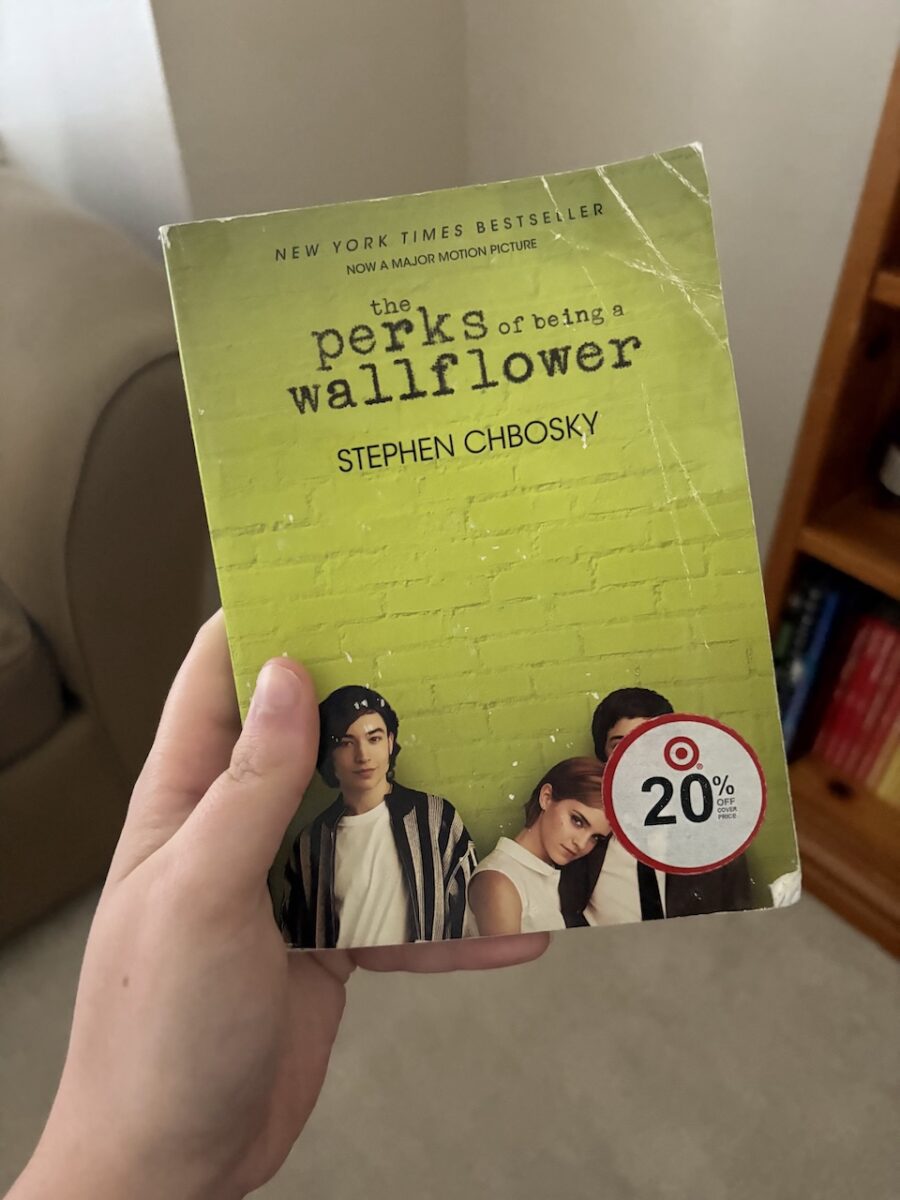
As you can tell by my well-worn copy, this was one of my favorite books as a teenager. (Sierra Rozen/COURIER HTX)
Based on a 1999 novel, and turned into a coming-of-age movie in 2012 starring Logan Lerman and Emma Watson, “The Perks of Being a Wallflower” was a formative part of my teen experience. It perfectly summed up the anxieties and excitements that come with entering high school. Though the subject matter can be controversial, I think it does a great job exploring sensitive topics.
The book has been banned due to theme of sexual abuse, LGBTQIA+ content, drug use, profanity, and sexual explicitness. In 2024, it was one of 64 titles removed from Plano ISD libraries.
“Stephen Chbosky’s ‘The Perks of Being a Wallflower’ is such a poignant, unfiltered account of being an American teenager. The way I see it, narratives like Perks—stories that explore themes of loneliness, sexuality, and mental health—are important for two reasons: With Perks, countless teenagers/young people are able to see themselves and their experiences mirrored in one or more of the many nuanced and intensely authentic characters, a cathartic experience that I believe everyone deserves. On the flip side, those who can’t necessarily relate are able to empathize and expand their worldview by virtue of watching the story unfold through Charlie’s, the main character, account of the plot. Charlie and the secondary characters are packed full of heart—they practically bleed off the page. Reading about their journeys enables consumers an in-depth look at characters whose lives are different than their own, which hopefully leads to a more diverse well of knowledge and a heightened understanding of the differing circumstances our fellow humans come from. To ban this and similar books is to limit both of these positive outcomes, a consequence I would caution anyone from glossing over.” — Violet Crain, Events and Communications Manager for Good on Paper Books and Stationery
“Me and Earl and the Dying Girl” by Jesse Andrews

The novel has been notoriously flagged for banning in Florida. (Sierra Rozen/COURIER HTX)
A darkly funny coming-of-age novel about an unlikely friendship between two aspiring filmmakers and a girl with cancer, “Me and Earl and the Dying Girl” would definitely raise some eyebrows while reading it, but I think it’s pretty accurate to the high school experience.
The book has been banned due to its sexually explicit content, profanity, and perceived degradation of women. It was also one of the most banned books of 2024.
“In earnest, I find it heartbreaking that the book-banning crowd is using poor reading comprehension as a tool to deny kids access to the very books that might make them better readers,” Andrews told Deadline.
“Whenever I take a glance at banned book lists, I see titles that are integral to developing empathy. Reading transports you directly into the mind of a book’s protagonist, and often results in consumers feeling or understanding what the main character does simply by virtue of the novel’s events playing out through their point of view. When I look at various novels on this list—’The Hate U Give,’ ‘Me, Earl, and the Dying Girl,’ ‘Go Ask Alice’—I recognize that I cannot necessarily relate to the experiences of each character. After all, I am not a Black teenager in America, I have not had cancer or watched a loved one go through that process, and I have never experienced drug addiction. However, as I view it, most people read for one of two reasons: to feel heard, or to learn.” — Violet Crain, events and communications manager for Good on Paper Books and Stationery
“New Kid” by Jerry Craft

“New Kid” is a 2019 graphic novel by Jerry Craft. (Sierra Rozen/COURIER HTX)
I’m not super familiar with graphic novels, but I went down a rabbit hole when researching “New Kid” by Jerry Craft. Research has shown that graphic novels and comics can sometimes be more easily banned because they are often viewed as only for children.
Those trying to ban the book often cite concerns about the book promoting, in their eyes, critical race theory.
“When I do these [school visits] on zoom or in person, it’s about me being a very reluctant reader. I hated reading books as a kid because—who were my heroes? The Black kid in ‘Tom Sawyer’ or ‘Huck Finn?'” Craft told NPR. “There was no kid who looked like me that I was proud of. It was ‘Black Panther’ … which came out, what, five years ago, that was the first time where I had goosebumps. That and ‘Into the Spider-Verse.’ I felt like I was 10 years old. What I would have given to have something like that when I was 10.”
“A Katy ISD mom asked to ban the graphic novel ‘New Kid’ by Jerry Craft in recent years claiming the book is ‘about critical race theory, which is forbidden by Texas law.’ In actuality this book is about a Black seventh grader at a mostly white school and it has scenes where the main character experiences very real moments of microaggressions and even overt racism. I’ve worked in a junior high and had to step in on multiple occasions throughout the year as the eighth graders I taught casually referred to each other with slurs and made wildly inappropriate comments to their peers on a daily basis that were rooted in racist profiles. My colleagues regularly let some of these moments slide because ‘they’re just kids, they don’t know what they’re saying,’ and that makes me wonder how often some of my students had to sit in a classroom where they were experiencing the same things as this main character. This story is very real and very important.”— Randi Null, Brazos Bookstore
“The Handmaid’s Tale” by Margaret Atwood
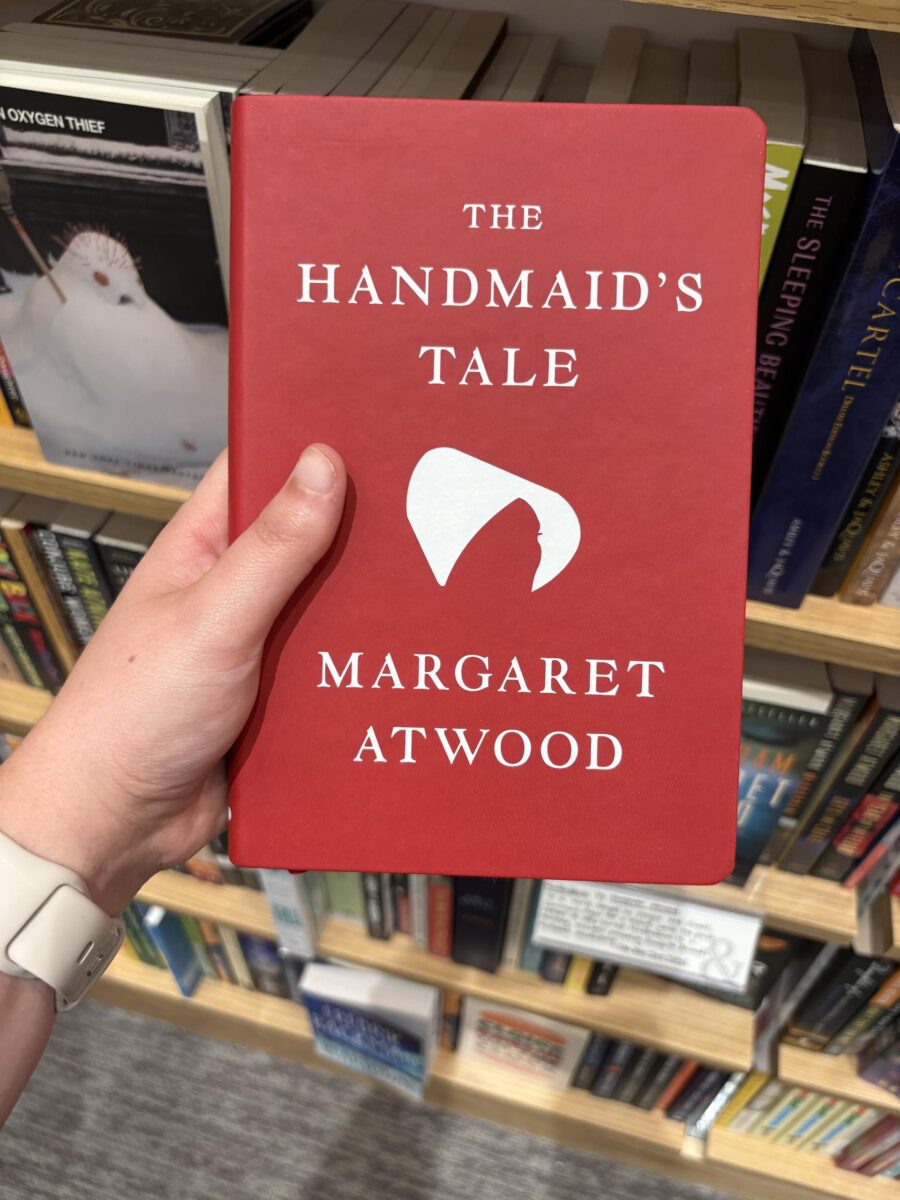
“The Handmaid’s Tale” has been banned in at least 26 states. (Sierra Rozen/COURIER HTX)
Originally published in 1985, “The Handmaid’s Tale” has won numerous literary awards, been adapted into a 1990 film, told as an opera in 2000, became an award-winning television series, and is one of the most challenged and banned books in the country.
Revolving around a dystopian society where women have had mostly all of their reproductive rights stripped (sound familiar?), the novel has sparked numerous debates in the decades since it’s been published.
“But, you know, you ban a book and it has a way of going underground,” Atwood told KCUR 89.3. “So sure, it gets kicked out of schools and libraries, but that does not stop people from reading it if they go in search of it.”
The book has been banned for its sexual content, profanity, and alleged anti-Christian themes.
“Margaret Atwood’s ‘The Handmaid’s Tale’ is important because it is a close and very scary dive into how religious texts and doctrine can be manipulated for strictly political purposes to control, oppress, and ultimately silence, which, to me at least, feels very much ripped from today’s headlines. The fact that some people want to ban it speaks volumes.” — David Cherry, of the Harris County Public Library
“Fahrenheit 451” by Ray Bradbury
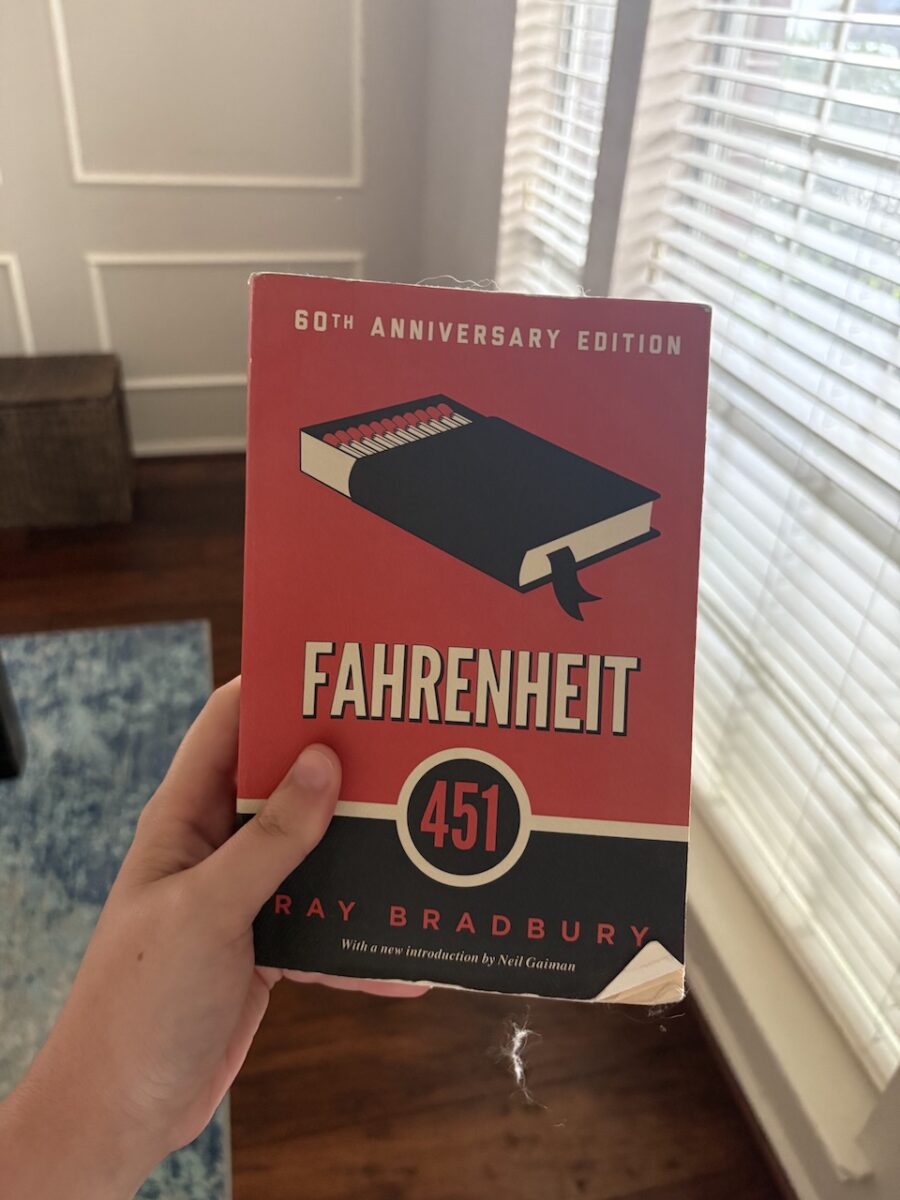
The novel was originally published in 1953 and has been the subject of intense scrutiny. (Sierra Rozen/COURIER HTX)
The novel takes place in a dystopian universe where books have been banned, and if found, are burned by firefighters. Personally, this sounds like my worst nightmare.
In 2007, the book was challenged by Conroe ISD due to “discussion of being drunk, smoking cigarettes, violence, ‘dirty talk,’ references to the Bible, and using God’s name in vain.”
With the discussion of the 10 Commandments being hung in schools and students being told to recite the Lord’s Prayer, I think it’s more important than ever to read literature surrounding the idea of censorship.




